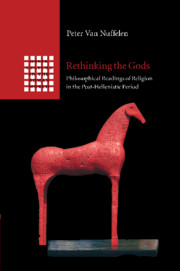Book contents
- Frontmatter
- Contents
- Acknowledgements
- Abbreviations
- Introduction
- Part I Ancient wisdom
- Part II Cosmic hierarchy
- Chapter 5 Towards the pantheon as the paradigm of order
- Chapter 6 The Great King of Persia and his satraps
- Chapter 7 Dio Chrysostom
- Chapter 8 Plutarch
- Part III Polemic and prejudice: challenging the discourse
- Bibliography
- Index
Chapter 8 - Plutarch
A benevolent hierarchy of gods and men
from Part II - Cosmic hierarchy
Published online by Cambridge University Press: 05 December 2011
- Frontmatter
- Contents
- Acknowledgements
- Abbreviations
- Introduction
- Part I Ancient wisdom
- Part II Cosmic hierarchy
- Chapter 5 Towards the pantheon as the paradigm of order
- Chapter 6 The Great King of Persia and his satraps
- Chapter 7 Dio Chrysostom
- Chapter 8 Plutarch
- Part III Polemic and prejudice: challenging the discourse
- Bibliography
- Index
Summary
In Chapter 5 I have set out how in the Post-Hellenistic period the hierarchical cosmos starts to function as a paradigm of order among Stoics and Platonists, and how this impacts on their understanding of both politics and religion. In Chapter 7 I have given details of this for Dio Chrysostom, the stoicising orator; the present chapter focuses on Plutarch of Chaeronea, whose vast corpus allows us to illustrate and specify the argument put forward earlier. Indeed, scholars such as J. Dillon and F. Ferrari have noted that hierarchies are essential for Plutarch to dispel disorder. In his philo-sophy this is linked to a specific metaphysical tenet: contrary to most of his contemporaries, who see matter as something amorphous and negative on which god acted to give it shape, he posits the existence of an irrational and material world soul, which is responsible for initial disorder but also for later disturbances in the cosmos. Plutarch's On the Generation of the Soul in the Timaeus, where this view is set out most explicitly, significantly ends on the comment that the gods are needed to maintain harmony and order in the cosmos: without the check of a hierarchy of gods and demons on the irrational world soul, the world would fall into anarchy.
This chapter argues that, although Plutarch's metaphysical position is peculiar to him and part of his original reinterpretation of Plato, we should also understand it against the background of the ideas about hierarchy as set out earlier. In line with the discourse on cosmic hierarchy, the action of the gods is exercised through a hierarchy, the importance of which is not limited to metaphysics. It has not been sufficiently noted before, indeed, that Plutarch applies the idea to politics as well: apart from accepting the existence of ‘natural rulers’, he can be shown to embed the ruler in a cosmic hierarchy. The idea of a cosmic and divine hierarchy also shapes Plutarch's concept of religion. As is well known, Plutarch accepted a hierarchy of demons, as did all Middle Platonists. This obviously allowed him to impose order on the traditional Homeric pantheon, by interpreting the various traditional gods as part of a hierarchy that obeys the highest god. Importantly, however, this hierarchical conception of the divine has a normative value, which surfaces most clearly in Plutarch's understanding of superstition. Complementing my discussion of superstition in Chapter 2, where I set out that for Plutarch superstition is a mistaken understanding of religion due to a lack of philosophical knowledge, I argue here that superstition also implies a failure to understand the hierarchical nature of the pantheon and, in particular, its benevolent nature: the superstitious man thinks that god is a tyrant and not a king. This suggests that the only correct way of understanding the pantheon is to see it as a benevolent hierarchy, which becomes even more explicit in the way Plutarch deploys the parallel of the pantheon with the Persian King and his satraps in his polemic against the Stoics in On Stoic Self-contradictions. By putting forward the hierarchically reordered pantheon as the only natural way of understanding religion, Plutarch succeeds in depicting the Stoics as ignorant and superstitious.
- Type
- Chapter
- Information
- Rethinking the GodsPhilosophical Readings of Religion in the Post-Hellenistic Period, pp. 157 - 176Publisher: Cambridge University PressPrint publication year: 2011

